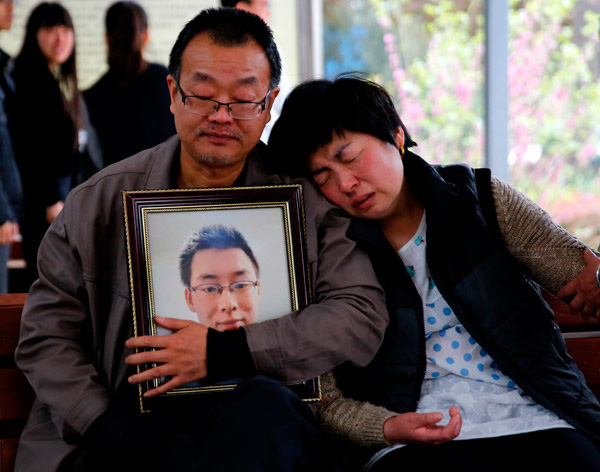Treatments for rare diseases ought to be covered by medical insurance
(China Daily) Updated: 2016-05-05 07:56
 |
|
The parents of Wei Zexi, a computer science major at Xidian University in Shaanxi province who died of a rare form of cancer, wait outside a funeral home in Xianyang, Shaanxi province, on April 13, 2016. [Photo by Wan Jia/For China Daily] |
THE DEATH OF WEI ZEXI, a college student who suffered from a rare type of cancer, continues to spark discussions online. An editorial on Beijing News said on Wednesday:
Wei's death has exposed to us an inevitable fact: There are large numbers of hospitals that charge high prices for ineffective treatments.
More worryingly, these hospitals get licenses from the medical authorities. They have even been given a name "Putian-style hospitals" because many of the investors in these private medical centers come from Putian in southeast China's Fujian province.
How to solve that? Some have proposed strengthening State regulation and requiring doctors to only give patients treatments that have proven effective. That proposal faces a dilemma in practice because some of the new treatments have not yet entirely proved their effectiveness but it is believed they will or that they offer the best hope of recovery.
Of course, Putian-style hospitals also use treatments that have already proven ineffective. However, in reality it can be difficult to distinguish one from the other.
To solve the problem, what we should ask is: What kinds of patients visit Putian-style hospitals?
The answer is: Those diagnosed with rare diseases, such as the rare cancer Wei had. They visit these private hospitals because the government's medical insurance system does not cover their diseases and if they visit public hospitals they will still need to spend lots of money, so they grasp the hope offered by experimental treatments.
More importantly, as the medical insurance does not cover their illnesses, the information about these diseases and the hospitals that offer treatments for them is far from sufficient for patients' to make informed decisions.
It is time the medical insurance covered more diseases. For those diseases not covered by the State, commercial insurance companies should offer cover. Of course, the government also needs to intervene to make sure they compete with each other instead of forming a monopoly.

I’ve lived in China for quite a considerable time including my graduate school years, travelled and worked in a few cities and still choose my destination taking into consideration the density of smog or PM2.5 particulate matter in the region.











